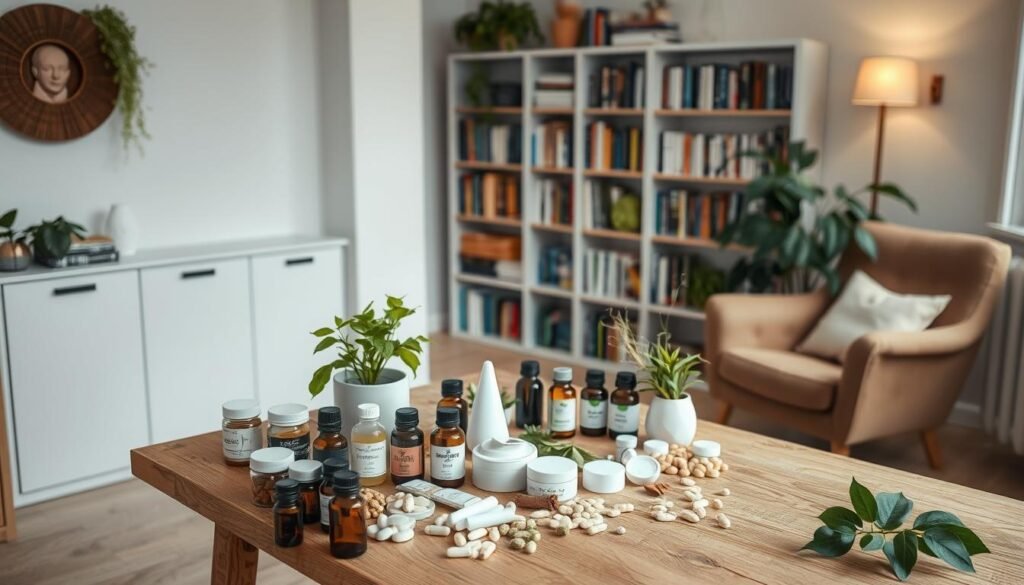More than 40 million adults in the U.S. struggle with anxiety disorders each year. That’s over 18% of the population. Addressing this issue is vital, especially for women who often experience anxiety differently. Knowing which anxiety medications work best for women is key. This guide will cover various medications, how well they work, and why getting help matters for anxiety relief.
Key Takeaways
- SSRIs and SNRIs are often the first-line treatments for anxiety.
- Women can experience unique symptoms and patterns of anxiety.
- Benzodiazepines are effective but must be used with caution due to dependency risks.
- Therapeutic options, including mindfulness and therapy, complement medication.
- Natural remedies can also provide relief for some individuals.
Understanding Anxiety Disorders in Women
Anxiety disorders are a big problem for women, affecting millions in the U.S. each year. Studies show that women are over twice as likely to suffer from these conditions as men. Common disorders include generalized anxiety disorder (GAD), panic attacks, and phobias, each affecting life differently.
Generalized anxiety disorder can mess with daily life, disrupting sleep and well-being. Panic disorder hits with sudden, intense attacks, making people feel trapped. Meanwhile, phobias cause extreme fear of particular things or situations, changing how a person lives.
Many things cause anxiety disorders in women, like hormonal changes and pressure from society. Issues like diabetes or heart disease can also make anxiety worse. Yet, less than 37% of those suffering get the help they need. This shows we need more awareness and better treatments for anxiety.
Treatment might mix medication, counseling, and therapy. Cognitive behavioral therapy (CBT) is especially good for treating anxiety. Medicines like antidepressants and buspirone help with symptoms. Sometimes, doctors prescribe sedatives or beta blockers for quick relief. It’s also key that more clinical trials include women, to improve treatments.
To manage anxiety, living healthy is key. Things like exercise, good sleep, and eating well help lower anxiety. However, alcohol, drugs, nicotine, and caffeine can make it worse. Practices like visualization, meditation, and yoga can also help calm anxiety.
Common Symptoms of Anxiety Disorders
Anxiety disorders cause many symptoms that greatly affect daily life. People often feel nervous, restless, or tense. They might have a fast heartbeat, sweat, shake, and find it hard to sleep.
Different anxiety disorders have unique symptoms. For example, generalized anxiety disorder involves ongoing worries that disrupt daily activities. People with this disorder might feel very tired, easily annoyed, get headaches, and have trouble focusing.
Panic disorder brings on sudden panic attacks. During these, you could have a racing heart, sweat, feel chest pain, and fear something awful will happen. These can happen without warning, frightening people many times a day.
Social anxiety disorder makes people extremely afraid of being judged. They might blush, sweat, or get stomachaches. They often avoid being with others, scared of being embarrassed or judged.
Phobias cause strong fear about specific things or situations, like heights or flying. If faced with these, someone with a phobia gets very anxious. They usually try to avoid these fears at all costs.
Table 1 below summarizes various anxiety disorders and their associated common symptoms:
| Anxiety Disorder | Common Symptoms |
|---|---|
| Generalized Anxiety Disorder (GAD) | Restlessness, fatigue, difficulty concentrating, irritability, headaches, sleep issues |
| Panic Disorder | Panic attacks, rapid heartbeat, sweating, chest pain, feelings of doom |
| Social Anxiety Disorder | Fear of judgment, blushing, sweating, stomachaches |
| Specific Phobias | Intense fear of specific objects/situations, avoidance behavior |
| Agoraphobia | Fear of public transport, crowds, enclosed spaces |
| Separation Anxiety Disorder | Fear of being away from close individuals, safety concerns |
| Selective Mutism | Failure to speak in specific social settings |
Importance of Seeking Treatment
About 40 million adults in the US struggle with anxiety disorders. They are one of the top mental health issues. Getting help is critical. Without treatment, anxiety might lead to serious health problems like heart disease and high blood pressure. People with symptoms such as fast heartbeat, muscle tension, or ongoing tiredness should see a doctor.
Effective treatment can truly help people with anxiety. Medications like SSRIs work by fixing chemical imbalances in the brain. Treatment often includes therapy with medication. This combo improves well-being and keeps new anxiety episodes away.
Putting off getting help can hide other health issues and make anxiety worse. Professional help teaches coping skills and improves life quality. This results in better social life, living longer, and enjoying everyday activities more.
Types of Anxiety Medications
Knowing about different anxiety medications helps in choosing the right treatment. Most of these medications need a doctor’s prescription. This overview describes various types and their features.

- SSRIs and SNRIs: Selective serotonin reuptake inhibitors and serotonin-norepinephrine reuptake inhibitors. They are often the first choice for treating anxiety. They have fewer side effects than other drugs. Examples include Prozac, Zoloft, and Paxil.
- Benzodiazepines: Drugs such as Klonopin, Xanax, and Valium work quickly against anxiety. They are good for generalized anxiety disorder and panic disorder. But, they can be addictive, so it’s important to use them as directed.
- Buspirone: A good choice for generalized anxiety disorder with less risk of addiction than benzodiazepines. It starts working in about two weeks.
- Antihistamines: Drugs like hydroxyzine stop histamine receptors in the brain, reducing anxiety symptoms. They are useful for short-term use.
- Beta Blockers: Mainly for heart issues, these can also help with anxiety symptoms like fast heart rate and shaking, when used in a different way.
It’s important to talk regularly with a healthcare provider to find the best anxiety medication. Comparing medications helps in understanding the options and customizing the treatment. Keeping patients safe is key, with close watch on side effects and making changes if needed. Advice from a psychiatrist can make treatment more effective.
Best Anxiety Medication for Women: An Overview
There are many treatments for anxiety disorders in women. SSRIs and SNRIs are often the top choices. Studies show they are effective and safe for easing anxiety symptoms.
SSRIs and SNRIs: First-Line Treatments
SSRIs like Zoloft and SNRIs such as Effexor are key in treating anxiety. They boost serotonin and norepinephrine, important for mood balance. These medicines have helped many women with their anxiety. SSRIs usually start working in 4 to 6 weeks. SNRIs might take a bit longer, around 6 to 8 weeks. For more details on these treatments, check out this link.
Understanding Tricyclic Antidepressants (TCAs)
TCAs are another choice if SSRIs or SNRIs don’t work. They are effective but can have more side effects. Some may feel sleepy or uncomfortable, which makes TCAs less popular. However, they can work as well as SSRIs for anxiety. Picking the best medicine involves weighing these effects.
Potential Side Effects of Anxiety Medications
It’s vital to know the side effects of anxiety medications for those looking into treatment. Being aware helps make better choices on handling anxiety. This is especially true for women, as their response to medication can differ.
Common Side Effects of SSRIs and SNRIs
SSRIs and SNRIs are widely used for treating anxiety. They work well but come with side effects, including:
- Nausea
- Insomnia
- Sexual dysfunction
- Weight gain
- Dry mouth
- Headaches
- Dizziness
While these side effects are usually manageable, it’s crucial to watch for any negative reactions. This helps in managing treatment better.
Understanding Benzodiazepine Risks
Benzodiazepines offer quick anxiety relief but have higher risks. They can lead to dependency, making careful consideration necessary. Risks of benzodiazepines include:
- Drowsiness and sedation
- Dizziness and loss of balance
- Memory impairment
- Increased risk of overdose
- Withdrawal symptoms like anxiety and tremors
Stopping benzodiazepines suddenly can be difficult. Often, a slow reduction under a doctor’s watch is needed. Knowing these risks helps in making informed treatment decisions.

| Medication Type | Common Side Effects | Dependency Risks |
|---|---|---|
| SSRIs/SNRIs | Nausea, insomnia, sexual dysfunction | Low |
| Benzodiazepines | Drowsiness, dizziness, memory impairment | High |
Natural Remedies for Anxiety
Many people looking for relief from anxiety consider natural remedies. These options focus on whole-body health, including lifestyle changes and herbs. It’s important to weigh the options and their benefits when looking into natural anxiety remedies.
Popular Natural Treatments
There are several key natural treatments that help manage anxiety. Below is a list of some widely used options:
| Natural Remedy | Benefits | Considerations |
|---|---|---|
| Kava | Potential to reduce anxiety | Reports of liver damage have led to FDA warnings |
| Passion Flower | May help with anxiety | Combination with other herbs complicates effects |
| Valerian | Possible stress reduction | Mixed results in studies |
| Chamomile | Potentially beneficial for Generalized Anxiety Disorder | Possible risk of bleeding when combined with blood thinners |
| Lavender | Might reduce anxiety through oral or aromatherapy | Need for further evidence |
| Lemon Balm | Indicated reduction in anxiety symptoms | Some individuals may experience nausea |
| Cognitive Behavioral Therapy | Recommended for effective anxiety management | May need to be combined with medication for best results |
| Exercise | Helps alleviate symptoms | Active lifestyles linked to lower anxiety rates |
| CBD | Studies suggest it aids in anxiety management | Varied individual responses |
Adding these natural remedies to daily life can boost well-being. Regular exercise is especially good for reducing anxiety. Meditation and weighted blankets can also help. For a broader look at options, natural remedies and traditional meds can be used together, as this guide explains.
Evaluating Anxiety Treatment Options
Looking into ways to tackle anxiety is key. It means checking out different treatments that fit your needs. Medications have unique roles in symptom management. Talking to healthcare experts will help find the right method for your kind of anxiety. This teamwork helps figure out which treatments work well, considering side effects and your health history.
Comparing Different Medications
Comparing anxiety meds helps people see the differences in treatments. We often see:
- SSRIs and SNRIs: Usually the go-to choice.
- Benzodiazepines: Great for quick relief but may lead to dependency.
- Buspirone: Doesn’t make you sleepy and has a lower dependency risk.
- Beta blockers: Mainly for the physical symptoms of anxiety.

The way these options affect you can vary a lot. Making a choice involves looking at how you’ve reacted to meds before and how they might interact with other meds you’re taking.
Choosing the Right Medication for You
Finding the correct medication is a journey. You need to think about:
- Efficacy: How effective the medication is in easing anxiety.
- Side Effects: Knowing possible downsides is critical for making a good choice.
- Personal Health: Your own health background and other health issues matter.
- Feedback from Providers: Talking to your healthcare provider helps ensure the choice fits your treatment goals.
Every person’s battle with anxiety is different, so personalized evaluation is crucial. Looking into resources on anxiety medications can help in picking the right options. In the end, a thorough evaluation and meaningful talks with your healthcare team will equip you with the info you need to make the best treatment choices.
Safety Considerations for Anxiety Medications in Women
Safety is crucial when using anxiety medications, especially for women. Women need to let healthcare providers know about any health issues, allergies, and family medical history before starting medication. This helps doctors suggest safe anxiety medications for women, reducing potential risks.
Medication interactions are a big safety concern. Women who are pregnant or breastfeeding need to be extra careful. They must choose medications that won’t harm them or their baby. Talking about all medicines and health conditions with a doctor is key.
Knowing about anxiety medication side effects is important too. Side effects differ with each medication. Some women might have few side effects, while others may struggle with more serious ones. Keeping track of these side effects and staying in touch with healthcare providers is important for adjusting treatment if needed.
Patients should be proactive about their health care. Learning about safe anxiety medications for women and possible side effects makes for wiser choices. This leads to safer and more effective treatment.
| Medication Type | Common Uses | Potential Side Effects |
|---|---|---|
| SSRIs | First-line treatment for anxiety disorders | Nausea, insomnia, sexual dysfunction |
| SNRIs | Effective for generalized anxiety disorder | Dizziness, dry mouth, fatigue |
| Benzodiazepines | Short-term anxiety relief | Dependence, sedation, withdrawal symptoms |
| Buspirone | Long-term chronic anxiety treatment | Dizziness, headaches, nausea |
Conclusion
It’s key to understand anxiety disorders in women for effective relief. This guide covers several treatment methods, including top medications. Among them, Selective Serotonin Reuptake Inhibitors (SSRIs) and Serotonin-Norepinephrine Reuptake Inhibitors (SNRIs) are leading choices. They help with different symptoms of anxiety.
An approach that combines medication, counseling, and lifestyle changes works well. Regular exercise is a part of this. Getting advice from professionals can make treatments more suited to individual needs. This boosts the chance of better results. More information on treatment effectiveness is available here.
Women facing anxiety should know they’re not alone. Working with healthcare providers who get the complexity of anxiety issues is crucial. They offer the support needed. The right treatment mix can lead to a life where anxiety is manageable.